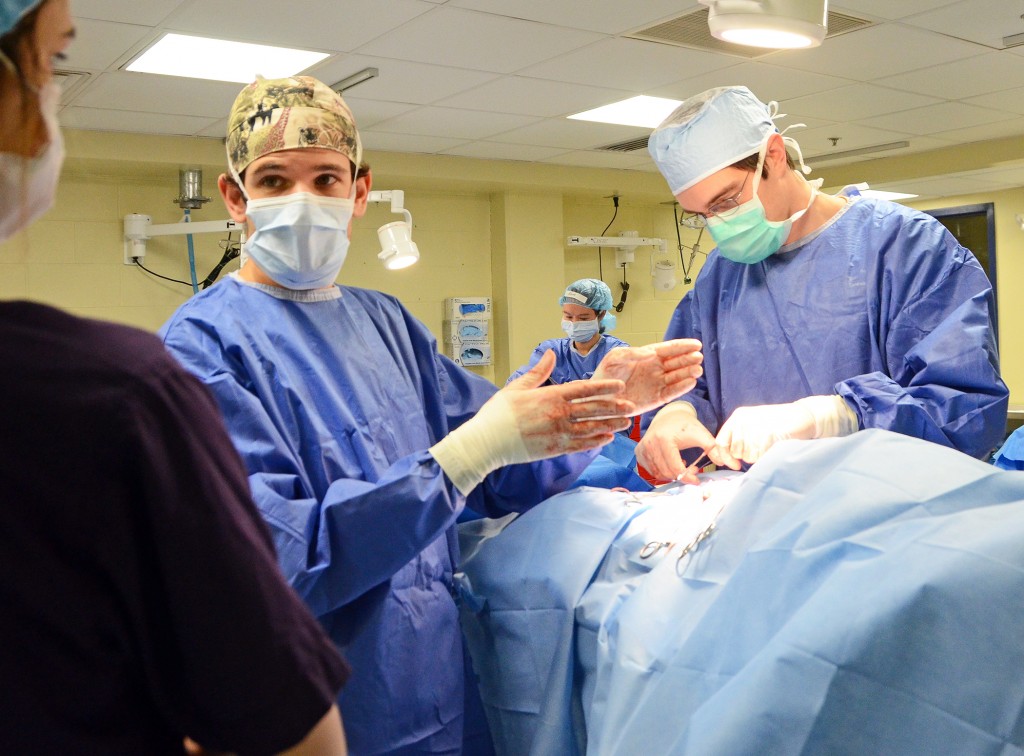A truly unique path through Fletcher: Dual MA-DVM degree
Despite our summer loneliness in a quiet Fletcher, I still have a few stories and updates from students to share. Emerson Tuttle completed his Fletcher studies in the one-year MA program in 2013, but he is still in the community as he finishes a degree in veterinary medicine. While we often say that no two students pursue the same courses at Fletcher, Emerson has a far stronger claim to uniqueness. He’s sufficiently unusual that the University’s media folks featured his story in a recent newsletter. Here is how Emerson reflects on his Fletcher experience.
As a former MA candidate from the class of 2013, my path to Fletcher was definitively atypical, as are my current pursuits. However, my experience in Medford was one that parallels that of all other Fletcher students in that it included rigorous academic challenges, exposure to a broad range of cultural perspectives, and the development of close bonds to mentors, future colleagues, and life-long friends.
I am a current combined degree student at Tufts with one more year remaining in the curriculum at the Cummings School of Veterinary Medicine (TCSVM) prior to graduating in the spring of 2015 with both a Doctor of Veterinary Medicine (DVM) and a Fletcher degree. I applied to TCSVM, in hopes of pursuing this underutilized combined program, after investigating the career possibilities available to a veterinarian with a background in international policy. Included in these career paths are veterinarians who work in public health, pandemic preparedness and mitigation, international disease control and trade policy, as well as international development.

For those whose connection to the veterinary profession is limited to bringing pets to their local small animal practitioner, understanding the connection between an international policy degree and the study of animal disease may be difficult. I was concerned that this would make my time at Fletcher challenging, in that I’d need to prove myself to relative experts in the field of international relations. With a BA in biology, my mind had been programmed to think in natural processes, ecosystems, and physiology, rather than law, economics, and diplomacy. I was pleasantly surprised when my classmates were able to grasp the connection between my degrees almost instantly, and welcomed me into what was a foreign environment for my scientific mind. Professors similarly welcomed me into their classrooms with an interest in how their knowledge could augment my own to develop an optimal learning experience for a non-traditional student (if one can say that there even is such a thing at Fletcher). Needless to say, the respect in which I hold classmates and professors alike is unparalleled.
My experiences at both TCSVM and Fletcher helped me secure a temporary position at the Food and Agriculture Organization of the United Nations during the summer immediately after my year at Fletcher. There I delved further into FMD control, albeit from an office in Rome as opposed to on the ground in Addis Ababa. The skills and perspective I gained from my studies at Fletcher allowed me to view veterinary questions through a unique lens, one that lent clarity to the socioeconomic issues generating the complex environment in which disease circulates. My work at the FAO gave me the opportunity to see how veterinarians are actively shaping international policies and regulations to mitigate the spread of infectious animal diseases worldwide, and one day I hope to do the same.
I write this post as I prepare myself for a difficult, yet extremely rewarding 15 months of clinical training at TCSVM. My brain has had to shift back to identifying clinical signs and differential diagnoses, as opposed to economic trends and points through which to exert effective policy action. Though the inside of an operating room is currently more familiar to me than the halls of Fletcher, the memories and experiences I carry with me from my time there will continue to open doors for me in the future, and will also continue to shape my life and professional career for the better.